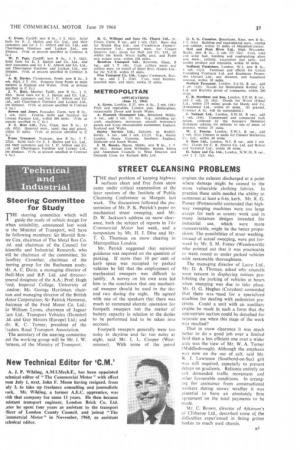STREET CLEANS ING PROBLEMS
Page 39

If you've noticed an error in this article please click here to report it so we can fix it.
THE dual problem of keeping highway I surfaces clean and free from snow came under critical examination at the later sessions of the Institute of Public Cleansing Conference at Margate last week. The discussions followed the presentation of Mr. P. K. Patrick's paper on mechanical street sweeping, and Mr.
D. W. Jackson's address on snow clearance, both the subject of reports in The Commercial Motor last week, and a symposium by Mr. H. J. Dive and Mr. T. G. Thomson on snow clearing in Metropolitan London.
Mr. Patrick suggested that national guidance was required on the question of parking. If more than 10 per cent of kerb space was occupied by parked vehicles he felt that the employment of mechanical sweepers was difficult to justify. A survey on his own area led him to the conclusion that one mechanical sweeper should be used in the day and two during the night. He agreed with one of the speakers that there was much to commend electric operation for footpath sweepers but the matter of battery capacity in relation to the duties to he performed had to be taken into account.
Footpath sweepers generally were too noisy in daytime and far too noisy at night, said Mr. I, L. Cooper (Westminster). With some of the petrol
engines the exhaust discharged at a point where damage might be caused to the more vulnerable clothing fabrics. In practice these units needed the ability to surmount at least a 6-in. kerb. Mr. R. G. Passey (Portsmouth) contended that highway sweeping machines were too large except for such as county work and in many instances designs intended for industrial use, which were more manceuvrable, might be the better proposition. The possibilities of street washing, instead of actual sweeping, were put forward by Mr. S. M. Foster (Wandsworth) who pointed out that it was practicable to wash round or under parked vehicles with reasonable thoroughness.
The managing director of Lacre Ltd., Mr. D. A. Thomas, asked why councils were reticent in displaying notices prohibiting the parking of vehicles at hours when sweeping was due to take place. Mr. 0. G. Hughes (Croydon) contended that there was meed for a specialized machine for dealing with pedestrian precincts. Could a unit with an auxiliary engine be made in such a form that the appropriate section could be detached for separate use when this stage of the work was reached?
That in snow clearance it was much better to do a good job over a limited field than a less efficient one over a wider area was the view of Mr. W. A. Turner (Middlesbrough). Although the emphasis was now on the use of salt, said Mr. R. J. Lawrence (Southend-on-Sea) grit was still required, especially to prevent delays on gradients. Reliance entirely on salt demanded traffic movement and other favourable conditions. In arranging for assistance from constructional workers during snowy' weather it was essential to have an absolutely firm agreement. On the total payments to be made.
Mr. C. Brown, director of Atkinson's of Clitheroe Ltd., described some of the difficulties expee.enced in fitting gritter bodies to much used chassis.




















































































































